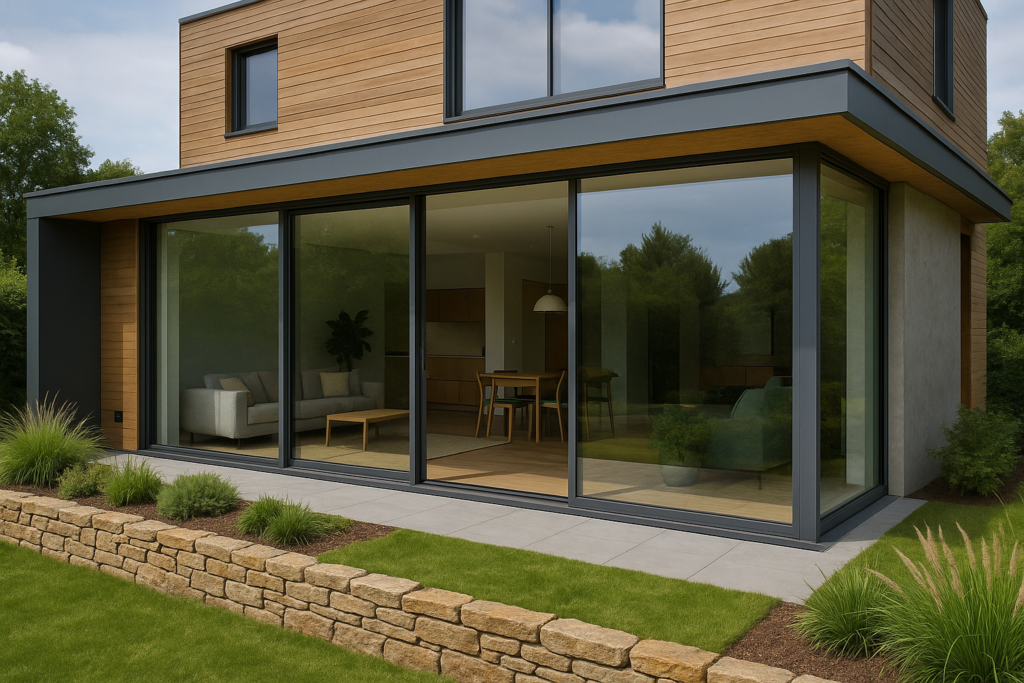Introduction: A Clear Choice for Eco-Conscious Design
In the evolving world of sustainable architecture, selecting the right materials can significantly influence a project’s environmental footprint and design integrity. One standout innovation making waves in both residential and commercial projects is Z-1 glass. Engineered for performance, durability, and environmental responsibility, Z-1 glass has become a go-to solution for sustainable interior and exterior applications.
In this article, we explore how Z-1 glass contributes to green design principles, elevates aesthetics, and supports sustainability goals across a wide range of architectural styles.
Why Z-1 Glass is Ideal for Sustainable Design
What is Z-1 Glass?
Z-1 glass is a premium, high-performance architectural glass that offers thermal efficiency, visual clarity, UV protection, and recyclability. It is used in windows, doors, facades, partitions, skylights, and landscape features, making it one of the most versatile and environmentally friendly building materials available.
The Core Z-1 Glass Benefits
- Superior insulation for energy savings
- Low-E coatings that reduce solar heat gain
- UV resistance to protect interiors
- Recyclability for zero-waste design goals
- High durability with minimal maintenance needs
For deeper comparison, explore Z-1 Glass Environmental Impact Compared to Regular Glass.
Z-1 Glass in Sustainable Interior Design
Natural Light Optimization
Z-1 glass allows maximum natural light while minimizing glare and heat transfer. This reduces reliance on artificial lighting, contributing to energy savings and enhancing occupant well-being.
- Ideal for office interiors, sunrooms, and retail spaces
- Supports biophilic design by connecting indoor spaces with nature
Interior Glass Partitions
Glass partitions made from Z-1 offer transparency without compromising energy performance or sound insulation. They’re ideal for modern offices and open-plan residential designs.
Shower Enclosures and Balustrades
Z-1 glass brings durability, style, and low-maintenance performance to bathrooms and staircases. Its resistance to moisture and corrosion makes it a long-lasting choice in humid interiors.
Decorative and Functional Features
Z-1 glass can be used in interior doors, shelving, and display cases, offering both form and function without environmental compromise.
Z-1 Glass in Sustainable Exterior Architecture
High-Performance Facades
Z-1 glass is a preferred material for curtain walls and façades due to its thermal insulation and solar control. These properties reduce energy loads and help buildings achieve green certifications.
- Compatible with passive solar design
- Resistant to weathering and UV exposure
Energy-Efficient Windows and Doors
Z-1 glass windows and doors contribute to net-zero energy goals by keeping indoor temperatures stable. Proper Z-1 glass installation ensures airtight performance and moisture protection.
Skylights and Atriums
Z-1 glass enhances daylighting in large indoor spaces while controlling solar heat gain. Its clarity and strength make it a safe and sustainable choice for overhead applications.
Z-1 Glass in Landscape and Outdoor Design
Outdoor Partitions and Privacy Screens
Use Z-1 glass to define spaces in outdoor gardens, patios, or pool areas. It provides privacy while preserving openness and connection to nature.
Water Features and Reflective Pools
Z-1 glass is ideal for eco-friendly fountains and water walls due to its resistance to corrosion and discoloration. Check out design examples in Beautiful Landscape with Sustainable Materials.
Garden Walls and Light Panels
In modern landscaping, Z-1 glass is used as a sustainable alternative to masonry for decorative panels and windbreaks.
Maintenance and Longevity of Z-1 Glass
Easy Cleaning and Upkeep
Z-1 glass requires minimal cleaning thanks to its smooth surface and resistance to buildup. For eco-friendly Z-1 glass maintenance:
- Use non-toxic, biodegradable glass cleaners
- Apply hydrophobic coatings to reduce water use
- Inspect seals and joints annually to maintain performance
Durability = Lower Lifecycle Cost
Thanks to its resistance to UV rays, thermal shock, and impact, Z-1 glass has an extended lifespan, reducing the need for frequent replacements and conserving resources.
Sustainable Manufacturing and Material Origin
Z-1 glass is produced using energy-efficient processes and often includes recycled content. Learn more about the sustainability of its production in Z-1 Glass Production Process and Its Eco Advantages.
Z-1 Glass and Circular Economy Integration
Designers and builders can specify Z-1 glass in circular construction strategies due to its:
- Recyclability at end-of-life
- Reuse potential in future projects
- Modular installation for disassembly
Explore more in Z-1 Glass and Its Role in Circular Economy Initiatives.
Z-1 Glass and Green Building Certifications
By incorporating Z-1 glass, projects can earn points under systems like LEED, WELL, and BREEAM. Z-1 glass contributes to:
- Energy and Atmosphere (EA): Reduced energy demand
- Indoor Environmental Quality (IEQ): Better daylighting and comfort
- Materials and Resources (MR): Recyclable content and long lifespan
Future Trends: Smart and Sustainable Glass Design
Smart Glass Capabilities
Z-1 glass technology is evolving to include smart features like electrochromic tinting and integrated solar cells, providing even more value in green design.
Integration with Renewable Systems
Z-1 glass works well with photovoltaic panels and green roofs, allowing architects to design truly integrated sustainable systems.
Conclusion: Z-1 Glass Delivers Eco-Driven Elegance
From interiors to landscapes, Z-1 glass empowers designers and builders to create beautiful, high-performance spaces that respect the planet. With unparalleled durability, energy savings, and recyclability, Z-1 glass is a critical component in the future of sustainable architecture.
Whether you’re specifying materials for a LEED-certified office tower or designing a minimalist outdoor retreat, Z-1 glass offers the clarity, performance, and eco-advantages today’s projects demand.

